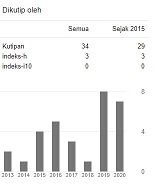Mathematical Model of Business Income in Kud Karya Bhakti Pakong Pamekasan
Abstract
Mathematical modeling is the process of deducing a mathematical model of a phenomenon based on the assumptions used. The purpose of a mathematical model is to make decisions based on real situations by analyzing the model. This research aims to obtain a mathematical model of income for KUD Karya Bhakti Pamekasan, to determine the most dominant variables influencing income and to determine the perception of the Karya Bhakti village community regarding income and progress of KUD in the area. The method used in this research is a quantitative method. Data collection techniques through literature study. Data analysis uses linear regression analysis to obtain a mathematical model, namely Y=228961 935 - 0.197x e. The constant is 228961935, which means that if income (Y) is non-existent or zero (zero), then the SHU (Y) in the cooperative will decrease by IDR 289,61,935. Meanwhile, the b value (regression coefficient) shows a negative value of 0.197. A value of 0.197 means that if income is zero then the SHU remains the same and every additional 1 sale reduces the SHU by 0.197.
Full Text:
PDFRefbacks
- There are currently no refbacks.
Copyright (c) 2024 INTERAKSI : Jurnal Kependidikan
ISSN: 1412-2952
INTERAKSI are abstracting & indexing in the following databases:

Published by Fakultas Keguruan dan Ilmu Pendidikan, Universitas Madura
Jl. Raya Panglegur Km 3,5 Pamekasan Phone: (0324) 322231
website: http://ejournal.unira.ac.id/index.php/jurnal_interaksi/index
Email: interaksi@unira.ac.id

INTERAKSI Jurnal Pendidikan by Universitas Madura is licensed under a Creative Commons Attribution 4.0 International License.



